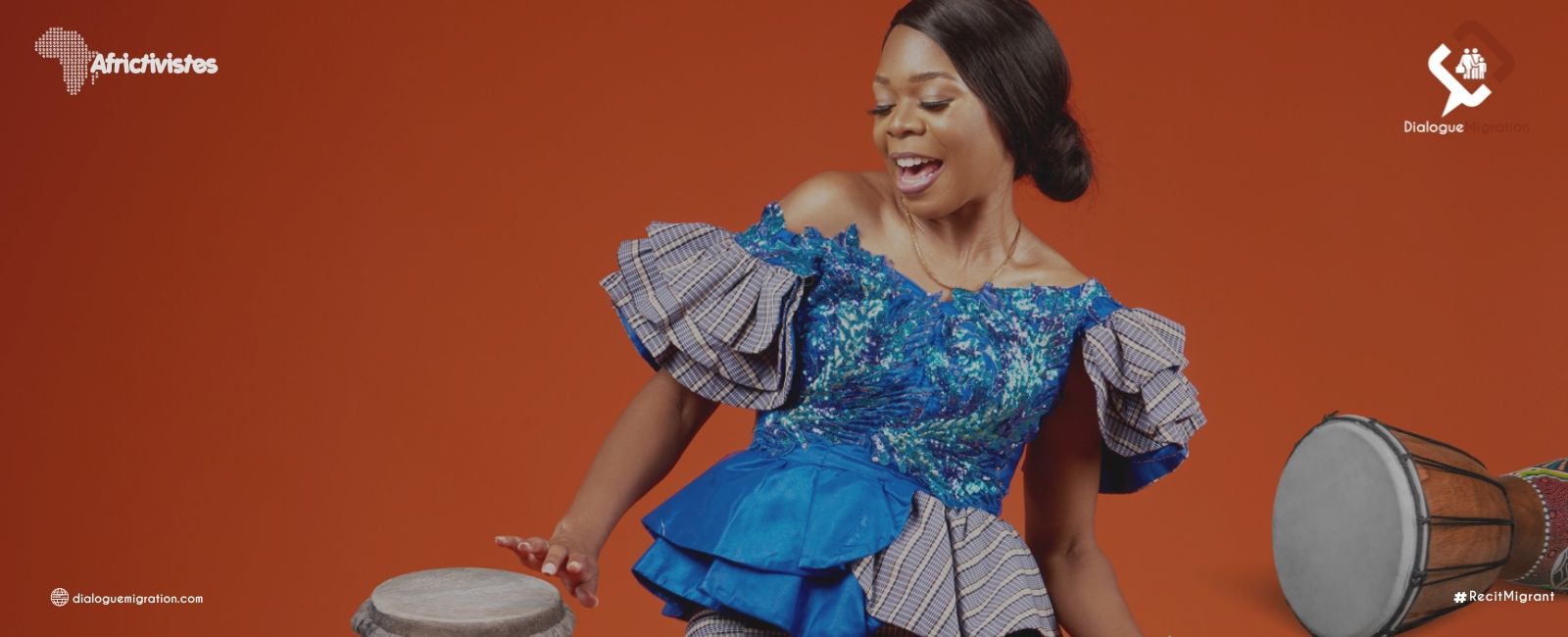

Migration is not only in the Africa-Europe direction. There are also those who choose the opposite path like the Franco-Congolese artist-musician Ankaa. Dialogue Migration takes you to discover this exceptional artist who talks about the reasons for her move to Benin, her musical projects and her prospects six years after leaving France, the country where she was born.
Known to lovers of good urban lyrical music as Ankaa, Estelle is an artist from Congo Brazzaville. Born in France in 1984, she grew up, studied and worked there. Her artist’s name, Ankaa, refers to the brightest star in the Phoenix constellation. She sings love in all its forms; whether it is about her partner, life, work, family … For her, love is the basis of everything.
The Frenchwoman of Congolese origin, well known for her captivating duets with her husband, did not decide to return to the continent in March 2017 without preparation. “We didn’t decide that one morning, we really prepared our arrival. We had to make about three or four trips to prepare for this big move with the whole family,” she explains.
According to her, this return makes sense. “I think it was more than a call, it was a need. We had this need to realize ourselves and this need also to return to our roots for our children, because there was a need for appropriation of culture. Something that we may not have forgotten but put aside,” Ankaa reveals.
Back in Cotonou with her small family six years ago, when her youngest was barely four months old, Ankaa, mother of four daughters including twins, would do the same if given the opportunity again. For her, this return makes sense, beyond the quest for Eldorado sold across the Mediterranean. “We had very good jobs, we had positions of responsibility but we had reached a level in our careers where we could not actually break the glass ceiling. So, we decided to leave everything we had and start over. So, we prepared this project as a family for years and we came back one day with the children,” she explains.
Impact projects in abundance
In Ankaa’s view, the lack of adequate frameworks for artistic promotion may explain the fact that most artists think much more about migrating to the West, when they begin to rise. A void that she wanted to fill with her partner by creating a framework in Africa, particularly in Benin. Back in Cotonou with her partner, they had a project of a bar and cultural space. With the bar, the Beninese-French-Congolese couple wanted to highlight local artists by offering them a platform for live, learning music with an orchestra and also a media structure, with her husband as the CEO. Though the bar has been closed, the media space and production for artists remain functional.
“We saw that there were many talented artists. There are really quite a few who, moreover, since these past years, continue to grow, continue to make very good music and we hope to do even better. We also needed to add to the existing structures because there are unfortunately not enough in place; and to bring our touch to this artistic environment,” says Ankaa.
Six years after her return, Ankaa finds Benin and Africa magical. “For me it was really important to come and settle in Benin, because it signaled my retour to Africa. And I really needed to go back to my roots, whether in Congo (Brazzaville) or Benin, because for me I consider it also my country,” says Ankaa. A Beninese at heart, she is also responsible for a personal development fund for a group in Benin.
A musical touch to “Jay-Z and Beyonce” and an album in in the works
Ankaa started very young in Gospel, Soul choirs and was also inspired by urban music and classical music. By meeting very young his spouse who was in music, a symbiosis will settle. “Strangely (laughs), I was in a group, I left that group when the gentleman joined this group. We have a kind of musical mix. He comes from a fairly urban musical background and I come from a musical background that is quite Soul Gospel. By dint of accompanying each other solo, we said ‘but why not make a piece together’,” she confides. Her duets with her spouse began just with covers of hits including the iconic title Love de Cotonou. A cover that will herald their arrival in Cotonou. The success of this song will give them even more enthusiasm. In their duet songs, the couple talks a lot about their personal experiences, their daily life; moreover “the first real single that we really shared with the world is “Entre nous deux“, Ankaa admits.
This voice of African and world music who sings both solo and in duet with her partner, who is also her manager and producer, is working on an album with songs well known to music lovers and also new hits: “a piece will talk about our story, a piece that will talk about love, of love and more love,” she points out with a smile and sparkling eyes.
The icing on the cake, for fans and music lovers, “this project is a baby that is sincere and original and not really classified in a genre. We will try to address all the topics that a couple could encounter as much in the genesis, the meeting, as in the jealousy. In lack of maturity at the beginning and this need for to build together, the disappointments … We will address all these topics,” she exclusively tells Dialogue Migration.
The glass ceiling …
While there is every reason to believe that in Africa, women are subject to the phenomenon of the glass ceiling, in the West, some also face it although gender and equality issues are addressed. Despite being born in the West, Ankaa notes that there is a side of rootedness and another side where you feel that you are not really in your place. “We have one foot in and one foot out and it’s true that I had very good experiences and conversely this feeling of having a professional limit where as an African in the environment in which I was, I could not evolve,” she regrets.
“Apart from the gender issue in the West, we also have this issue of origins unfortunately,” she said. “I was responsible for a children’s leisure facility and I worked in a local public office. I went through competitions to be able to have this position and I claimed to be able to pass more competitions to go much higher as Head of Department, Director … But in the city I was in, in the community I was in, it was complicated. Let’s say, it was quite politicized…,” she explains.
As a potential source of inspiration because of her status as an artist-musician, Ankaa had this to say to young people and many others including those who want to travel to Europe or intend to return to Africa: “The message I could pass on to young people is not necessarily to leave and come back, but what added value we can bring to our own country, to our continent? And I think you really have to ask yourself very early on to know, if I leave, if I learn things outside, how could they serve my community, how to use that knowledge… These are big questions.”
Knowing Benin as well as Congo Brazzaville, Ankaa who has been in Senegal and recently in Côte d’Ivoire said that “Africa, speaking of borders, has none. We can find a Beninese in Senegal who will be so at home that finally it does not seem that they are from Benin. Truly, Africa has no borders. We could have come to Benin, as we could have gone to Senegal, Côte d’Ivoire, Guinea, Cameroon and also feel at home there,” she said.
However, Ankaa feels a deep sadness for the people who see some countries as the promised land, where they can work, a place where they can enjoy their full rights. Unfortunately, rights are not upheld in these countries. She hopes that international measures will be taken against these countries.
“I think that if you feel you need to go and work in another country, you have to be sure that you are in your full right. And I think that currently in some countries this is not yet the case, unfortunately. I urge all our brothers and sisters to avoid going to this type of country where their rights for work, and their natural rights are not respected,” she said. For Ankaa, the migration of artists is not to be decried. “I think it’s a choice. We have a lot of artists who go through it to get visibility, better training, better opportunities and then come back to the country as a model of success,” she says. Through her choice, that of coming to settle in Benin, Ankaa intends to bring added value to the country and the Western world.


